Herbal teas offer significant benefits for detoxification, hydration, and digestive support. They help cleanse the body, enhance fluid intake, and aid digestion. Key herbs like dandelion and milk thistle promote detoxification, while hibiscus and chamomile enhance hydration. Peppermint and ginger support digestive health, making herbal teas a natural choice for improving overall wellness.
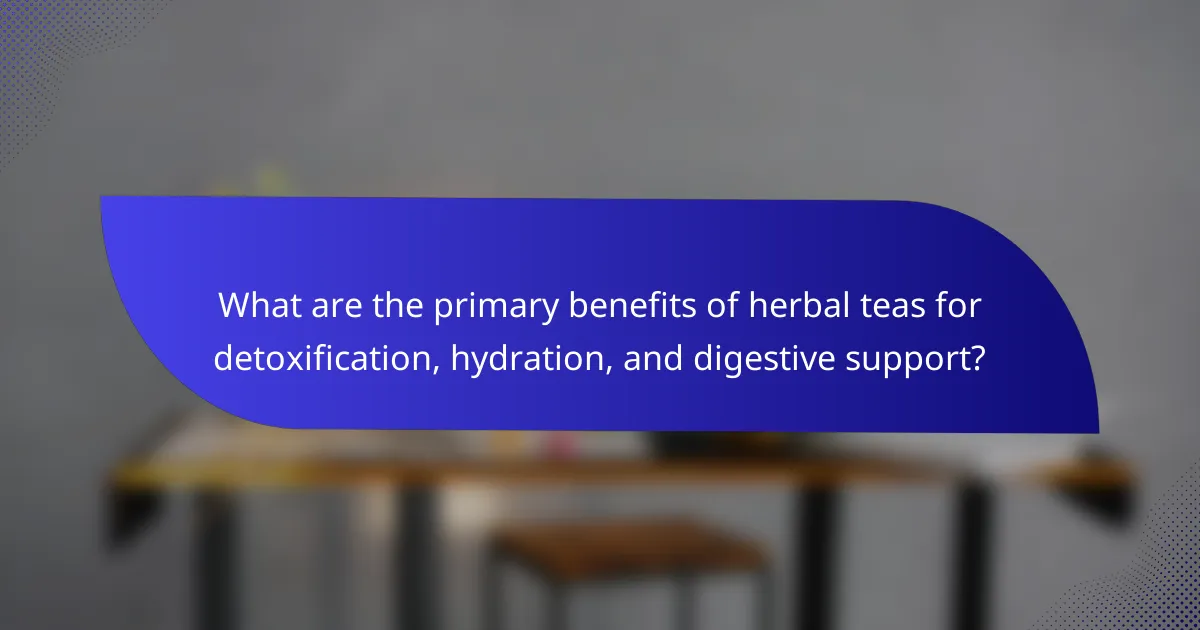
What are the primary benefits of herbal teas for detoxification, hydration, and digestive support?
Herbal teas provide significant benefits for detoxification, hydration, and digestive support. They contain natural compounds that promote cleansing, enhance fluid intake, and aid digestion.
Detoxification is supported by herbal teas like dandelion and milk thistle, which help the liver eliminate toxins. Hydration is enhanced by teas such as hibiscus and chamomile, which are rich in water content and antioxidants. For digestive support, peppermint and ginger teas can alleviate discomfort and stimulate digestion.
Incorporating herbal teas into daily routines can improve overall wellness. They offer a natural and flavorful way to support bodily functions while promoting hydration and digestive health.
How do herbal teas aid in detoxification processes?
Herbal teas support detoxification by promoting hydration, aiding digestion, and facilitating the elimination of toxins. Ingredients like dandelion and nettle enhance liver function, while ginger and peppermint improve digestive health. These teas often contain antioxidants that help combat oxidative stress, further assisting the body in its natural detox processes. Regular consumption can lead to improved overall wellness and increased energy levels.
Which herbal teas are best for hydration and why?
Herbal teas like hibiscus, peppermint, and chamomile are excellent for hydration due to their high water content and natural flavors. Hibiscus tea, for example, is rich in antioxidants and can help maintain fluid balance. Peppermint tea offers a refreshing taste that encourages fluid intake, while chamomile tea is soothing and hydrating. These herbal options not only provide hydration but also support detoxification and digestive health, making them beneficial choices overall.
What role do herbal teas play in promoting digestive health?
Herbal teas significantly promote digestive health by aiding in digestion, reducing bloating, and enhancing nutrient absorption. Chamomile and peppermint are particularly effective in soothing the stomach and alleviating discomfort. Additionally, herbal teas can stimulate digestive enzymes, improving overall gut function. The antioxidants in these teas contribute to gut health by reducing inflammation and promoting a balanced microbiome.
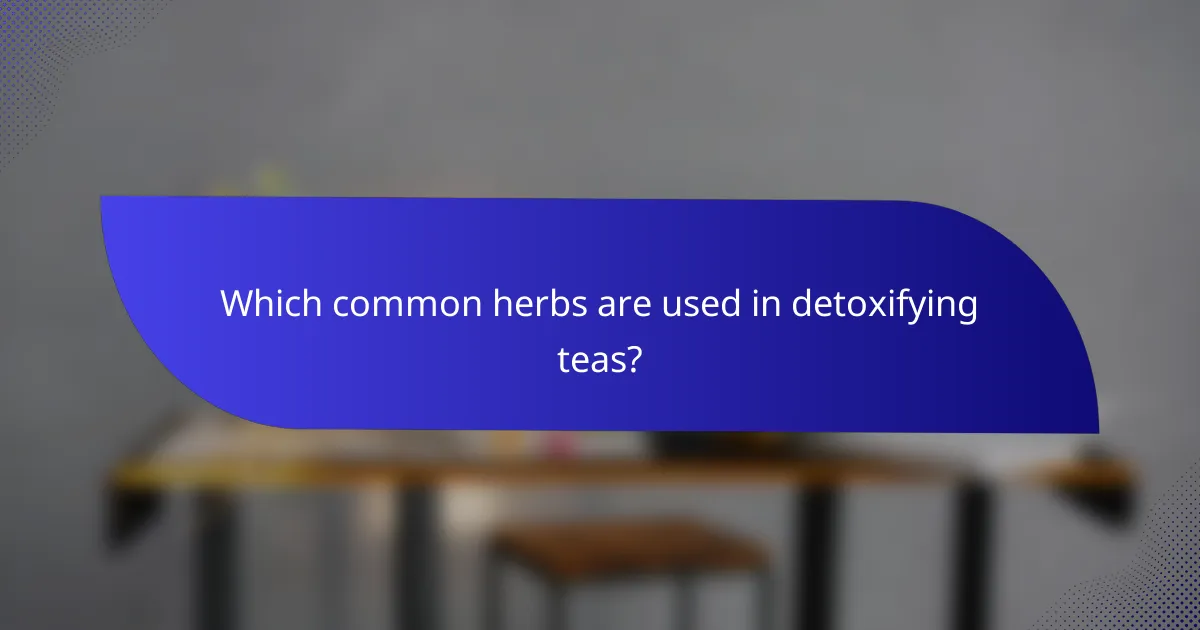
Which common herbs are used in detoxifying teas?
Common herbs used in detoxifying teas include dandelion, ginger, peppermint, nettle, and milk thistle. These herbs support detoxification, hydration, and digestive health.
Dandelion acts as a natural diuretic, promoting kidney function. Ginger aids digestion and reduces inflammation. Peppermint enhances digestion and provides a refreshing flavor. Nettle is rich in nutrients and supports liver health. Milk thistle contains silymarin, which protects the liver from toxins.
What are the health properties of dandelion root in detoxification?
Dandelion root supports detoxification through its diuretic properties, promoting kidney function and flushing toxins. It contains antioxidants that combat oxidative stress and may enhance liver health. Additionally, dandelion root aids digestion, further supporting the detox process. Its unique attribute is the presence of inulin, a prebiotic fiber that fosters gut health.
How does peppermint tea support digestion?
Peppermint tea aids digestion by relaxing the muscles in the gastrointestinal tract. This calming effect can alleviate symptoms like bloating and gas. Peppermint contains menthol, which enhances bile flow, improving fat digestion. Additionally, its antispasmodic properties can reduce digestive discomfort. Regular consumption may support overall digestive health and comfort.
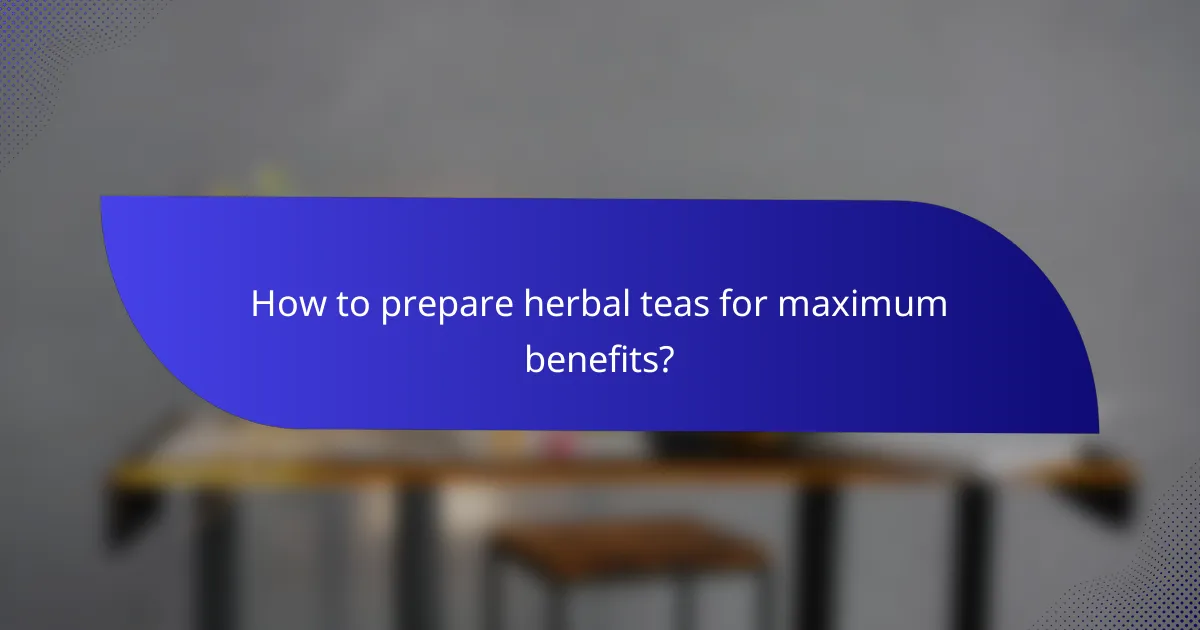
How to prepare herbal teas for maximum benefits?
To prepare herbal teas for maximum benefits, use fresh or dried herbs, steep them in hot water, and allow adequate infusion time.
Start by selecting herbs known for detoxification, hydration, or digestive support, such as peppermint, chamomile, or dandelion. Use one tablespoon of dried herbs or three tablespoons of fresh herbs per cup of water. Boil water and pour it over the herbs, letting them steep for 5 to 15 minutes depending on the desired strength.
Strain the tea and enjoy it hot or cold. Adding honey or lemon can enhance flavor and benefits. Consider the unique properties of each herb to tailor your tea to your specific health needs.
What are the ideal brewing times and temperatures for different herbal teas?
Herbal teas should be brewed at specific times and temperatures for optimal detoxification, hydration, and digestive support. Generally, steep herbal teas for 5 to 15 minutes at temperatures between 200°F to 212°F (93°C to 100°C).
| Herbal Tea | Brewing Time | Temperature |
|———————|————–|—————|
| Peppermint | 5-7 minutes | 200°F (93°C) |
| Ginger | 10-15 minutes| 212°F (100°C) |
| Chamomile | 5-10 minutes | 200°F (93°C) |
| Dandelion | 10-15 minutes| 212°F (100°C) |
| Rooibos | 5-7 minutes | 200°F (93°C) |
| Hibiscus | 10-15 minutes| 212°F (100°C) |
Which forms of intake enhance the effectiveness of herbal teas?
Certain forms of intake can enhance the effectiveness of herbal teas. Consuming herbal teas on an empty stomach maximizes absorption and benefits. Drinking them warm promotes better digestion and nutrient release. Additionally, pairing herbal teas with complementary foods, like citrus fruits, can boost their detoxifying properties. Lastly, regular consumption fosters cumulative health benefits over time.
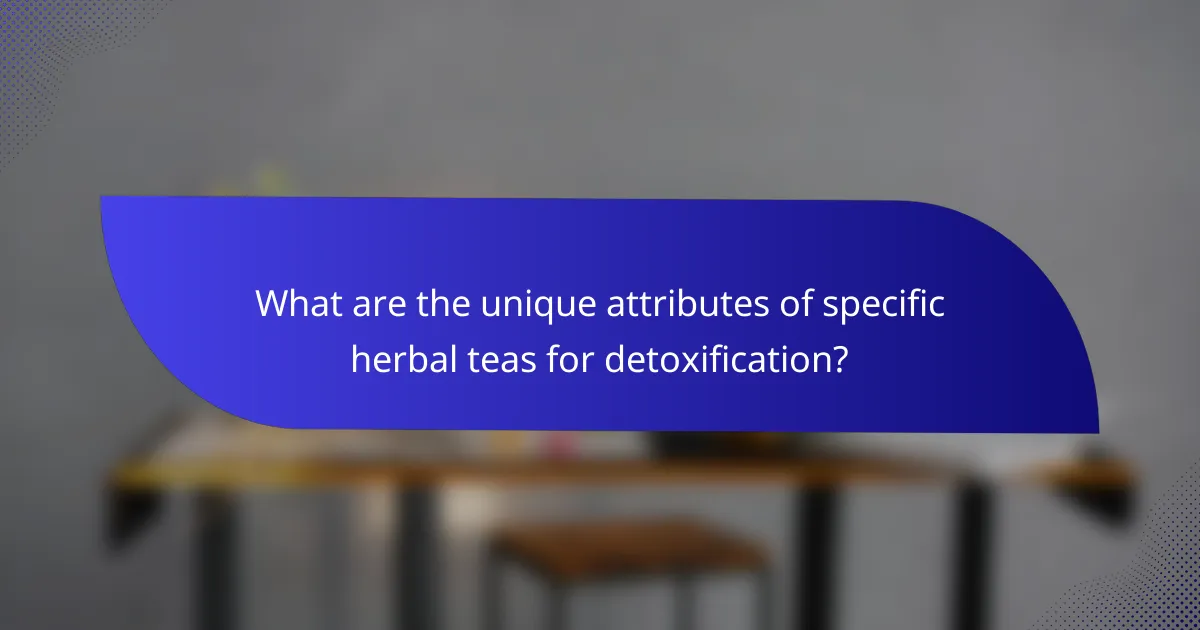
What are the unique attributes of specific herbal teas for detoxification?
Herbal teas for detoxification possess unique attributes that enhance their effectiveness. For instance, dandelion tea supports liver function, while nettle tea aids in flushing toxins. Additionally, milk thistle tea contains silymarin, a rare compound that protects liver cells. Peppermint tea promotes digestion, contributing to overall detoxification. Ginger tea has anti-inflammatory properties, which can help soothe digestive discomfort. Each of these teas offers specific benefits that support hydration and digestive health.
How does hibiscus tea contribute to hydration and detoxification?
Hibiscus tea significantly enhances hydration and supports detoxification. Its high water content helps maintain fluid balance, while antioxidants promote the elimination of toxins. Studies show hibiscus tea may also aid kidney function, improving waste removal. Its unique properties include diuretic effects, which further assist in flushing out impurities.
What makes ginger tea a popular choice for digestive support?
Ginger tea is popular for digestive support due to its anti-inflammatory properties and ability to soothe the stomach. It aids in alleviating nausea, reducing bloating, and promoting healthy digestion. The presence of gingerol, a bioactive compound, enhances these benefits. Additionally, the warmth of the tea can relax the digestive tract, further supporting overall digestive health.

What are the potential side effects of herbal teas?
Herbal teas can cause side effects such as digestive discomfort, allergic reactions, and interactions with medications. Some herbal ingredients may lead to rare but serious effects like liver toxicity or increased heart rate. Always consult a healthcare provider before use.
Which herbal teas should be avoided during pregnancy or with certain health conditions?
Certain herbal teas should be avoided during pregnancy or with specific health conditions. These include teas containing herbs like chamomile, sage, and peppermint, which may pose risks.
Chamomile can lead to allergic reactions and may affect pregnancy. Sage can stimulate uterine contractions, while peppermint may exacerbate heartburn in some individuals.
Always consult a healthcare provider before consuming herbal teas during pregnancy or if you have health conditions.
How to identify allergies related to herbal teas?
To identify allergies related to herbal teas, monitor symptoms after consumption. Common signs include skin rashes, gastrointestinal discomfort, or respiratory issues. Keep a detailed log of tea types and reactions to pinpoint specific allergens. Consulting a healthcare professional can provide further insights into potential sensitivities.
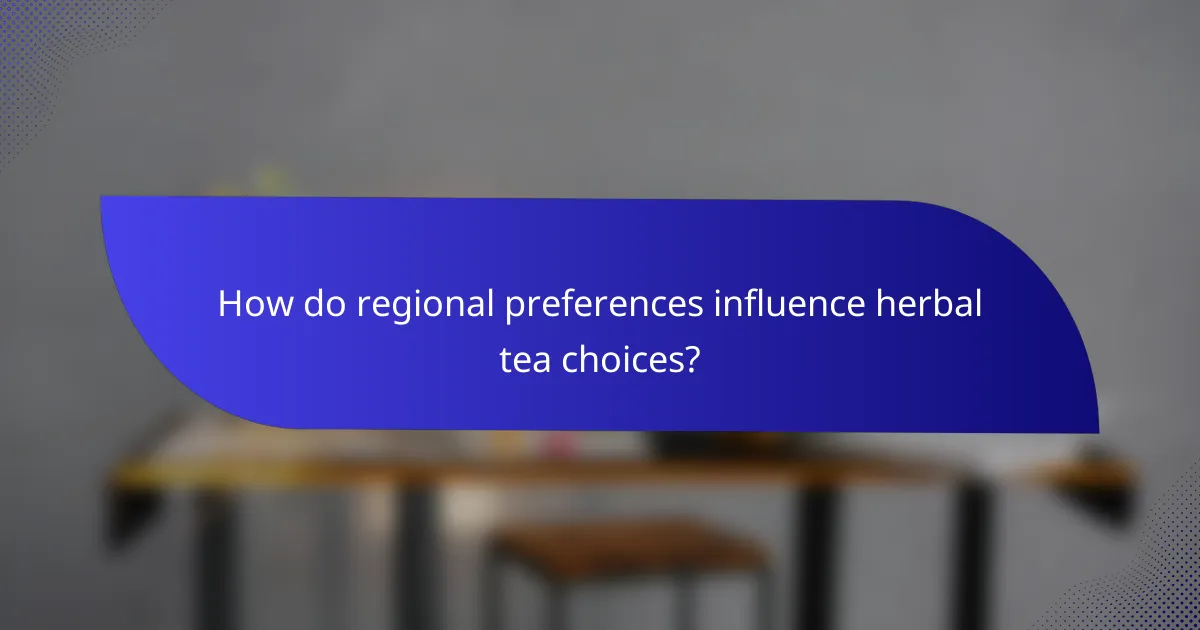
How do regional preferences influence herbal tea choices?
Regional preferences significantly shape herbal tea choices by influencing flavor profiles, ingredient availability, and cultural practices. For instance, Asian regions often favor green tea for detoxification, while Western cultures may lean towards chamomile for digestive support.
Local climate and agricultural practices also play a role. In warmer climates, refreshing herbal blends like peppermint are popular, promoting hydration. Conversely, colder regions may prefer spiced teas, which provide warmth and comfort.
Cultural traditions further dictate preferences. In some cultures, specific herbs are believed to carry health benefits, leading to their frequent use in local herbal blends. For example, ginger is revered in many Asian countries for its digestive properties.
Overall, understanding these regional influences helps in selecting herbal teas that align with both health benefits and personal taste preferences.
What herbal teas are commonly used in North America for detoxification?
Common herbal teas for detoxification in North America include dandelion, burdock root, peppermint, and ginger. These teas support hydration and digestive health. Dandelion tea acts as a diuretic, promoting liver function. Burdock root tea helps purify the blood and improve skin health. Peppermint tea aids digestion and soothes the stomach. Ginger tea enhances metabolism and reduces inflammation. Each tea offers unique benefits, making them popular choices for detoxification.
Which herbal blends are popular in European cultures for hydration?
Popular herbal blends in European cultures for hydration include chamomile, peppermint, and rooibos. These teas are known for their soothing properties and ability to promote hydration.
Chamomile tea is often enjoyed for its calming effects and mild flavor, making it a favorite for relaxation. Peppermint tea provides a refreshing taste and can aid digestion, contributing to overall hydration. Rooibos, a naturally caffeine-free option, is rich in antioxidants and has a slightly sweet flavor, making it popular in various European regions.
These herbal blends not only hydrate but also offer additional health benefits, enhancing their appeal in European cultures.

What are the best practices for incorporating herbal teas into a daily routine?
Incorporating herbal teas into a daily routine enhances detoxification, hydration, and digestive support. To effectively integrate them, consider these best practices.
1. Choose a variety of herbal teas that target specific health benefits, such as peppermint for digestion or dandelion for detoxification.
2. Establish a consistent time for tea consumption, like morning or evening, to create a routine.
3. Experiment with different brewing methods, including steeping time and water temperature, to optimize flavor and benefits.
4. Stay mindful of caffeine content; opt for caffeine-free herbal options to avoid sleep disruption.
5. Pair herbal teas with a balanced diet to maximize their health benefits and support overall wellness.
How to choose the right herbal tea based on individual health goals?
To choose the right herbal tea based on individual health goals, consider the specific benefits each tea offers. Herbal teas can support detoxification, hydration, and digestion.
For detoxification, teas like dandelion and milk thistle help cleanse the liver. For hydration, hibiscus and peppermint teas are refreshing and hydrating. For digestive support, ginger and chamomile teas can soothe the stomach and promote digestion.
Identify your health goal first, then select a tea that aligns with that goal. Each herbal tea has unique properties that can enhance your wellness journey.
What common mistakes should be avoided when using herbal teas for health benefits?
Common mistakes to avoid when using herbal teas include overconsumption, neglecting individual allergies, and using poor-quality ingredients. Overconsumption can lead to adverse effects, while allergies to specific herbs can trigger reactions. Using low-quality teas may reduce the expected health benefits, such as detoxification and digestive support. Always ensure proper preparation methods to maximize hydration and effectiveness.
How to optimize the effects of herbal teas for detoxification, hydration, and digestive support?
To optimize the effects of herbal teas for detoxification, hydration, and digestive support, focus on selecting the right herbs, proper brewing techniques, and timing. Use herbs like dandelion for detox, chamomile for digestion, and hibiscus for hydration.
1. Choose high-quality, organic herbs to ensure potency and reduce contaminants.
2. Brew teas at the recommended temperature and duration to extract beneficial compounds effectively.
3. Consume herbal teas consistently, ideally before meals for digestive benefits or throughout the day for hydration.
4. Combine different herbal teas to enhance effects; for example, mix peppermint and ginger for digestive support.
These practices maximize the health benefits of herbal teas, supporting detoxification, hydration, and digestion effectively.